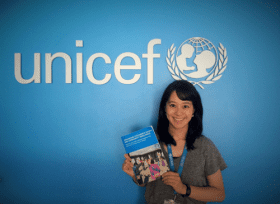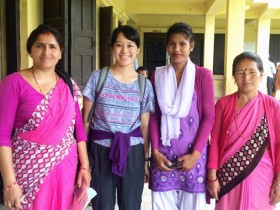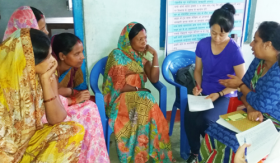 This is part of a recurring series in which we share reports from Harvard students who have traveled to South Asia with support from a SAI grant.
This is part of a recurring series in which we share reports from Harvard students who have traveled to South Asia with support from a SAI grant.
By Yoko Okura, MPP, Harvard Kennedy School, 2017
In April 2015, Nepal made headlines worldwide when a devastating earthquake struck the country, taking 9000 lives and affecting 8 million. Children, especially vulnerable to disasters, accounted for 30% of the deaths. 700,000 houses and 35,000 classrooms were destroyed, and many children continue to learn in temporary shelters over a year after the earthquake.
As an intern for the emergency unit of UNICEF NEPAL, my main responsibilities were to monitor the community-based and school-based disaster reduction programs implemented across the country. In addition to the ongoing earthquake recovery efforts, UNICEF Nepal provides significant work to a country also prone to other natural disasters such as droughts, fires, floods, and landslides; such disasters on average affect 335,000 people and kill 1,000 annually.
During my internship, I traveled to three different districts across Nepal to conduct stakeholder interviews with community leaders, local government officials, members of children clubs and women’s clubs, teachers, students, and parents on the impact of these programs since their implementation in 2014. The interviews identified both positive outcomes and challenges to UNICEF’s disaster risk reduction programs, which includes community hazard mapping, school evacuation drills, and first aid training.
For example, I learned that stakeholders in all districts were unanimous in their support for creating a seasonal hazard calendar to raise community awareness to prepare for a disaster. Moreover, the formation and activation of a local disaster management committee at the ward level was essential to ensure the programs would be implemented in policy, after the program ended. I was surprised to learn that even in flood-prone areas, schools did not have evacuation plans prior to the implementation of UNICEF’s programs, and realized the importance of transferring knowledge on how to prevent, mitigate, and react to natural disasters.
As the final deliverable, I compiled all of my learnings and best practices into a report so that these invaluable lessons are ensured as the programs are scaled to other districts. I was very happy to see that the report contributed to further funding from an American foundation, so more districts could benefit from community based and school based DRR programs. I also felt the urgency and necessity of knowledge and awareness towards disasters as monsoon rain caused flooding and landslides across the country, resulting in over 100 deaths in just one week, in July.
My internship at UNICEF Nepal has served as an opportunity to put my year of invaluable training at the Harvard Kennedy School in econometrics, leadership, management, negotiations, and statistics to use in a real-life and impactful setting. After working in Nepal for a month, I find that the lessons and skills I have learned from my HKS classes have strengthened both my analytical judgement and interpersonal skills. Working in the UNICEF Nepal office, where my colleagues come from all over the world, you need to present your work persuasively with evidence, but also communicate effectively.
I am thankful to the South Asia Institute for providing me with a wonderful opportunity to apply my learnings and explore my passion and interests. The internship would not have been possible without your support!


